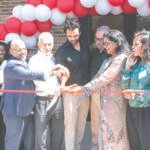In Your Opinion: Vote To Save Local Environment
Submitted by the Franklin Township Task Force On Compressor Station 206 and NESE.
In October, Councils of both Princeton and Franklin Township passed resolutions urging the New Jersey Department of Environmental Protection (NJDEP) to deny the permit applications for the Northeast Supply Enhancement (NESE) Project.
Four days before the seventh anniversary of Superstorm Sandy, it was anticipated that the NJDEP would issue their decisions about the permit applications for the NESE Project. That did not happen. Rather, Williams/Transco withdrew three permit applications for NESE and asked for a 30-day extension for another permit decision on October 25, 2019.
Three days later, on October 28, 2019, Williams/Transco submitted new applications for a Waterfront Development Individual Permit with a Section 401 Water Quality Certification – one for in-water and one for upland activity, and a Coastal Zone Consistency Determination.
For the Flood Hazard Area Individual Permit application, NJDEP’s acceptance of the 30-day extension request means that NJDEP needs to issue their decision on this application by November 28, 2019.
According to state laws, there is no 90-day timeline requirement for a decision on the Freshwater Wetlands Individual Permit application that was submitted on June 12, 2019.
However, a decision on the Section 401 Water Quality Certification application needs to be made within one year of when the NJDEP received it according to the Federal Clean Water Act. Thus, a decision on the Section 401 Water Quality Certification would likely be due no later than June 11, 2020.
Applications to the New York Department of Environmental Conservation (NYSDEC) were last submitted on May 17, 2019. Here, too, the one-year timeline applies, so a decision is expected by May 16, 2020 for their part of the NESE Project.
As we wait for the review of the fourth set of applications to NJDEP as well as actions expected in late November, we cannot become weary since the reasons to oppose this Project (that have been noted for over three years) are still relevant.
It can become overwhelming to continue voicing concerns about NESE when there is propaganda from National Grid (the planned recipient of the additional gas from NESE) and their moratorium on gas service in 2019 unless NESE got approval from New York’s DEC (even though, at the earliest, the NESE gas wouldn’t be available until the winter of 2020-2021), Federal efforts to curtail states’ rights to protect their waters and air through the permitting process, and the political and financial influences on decisions as well as the understanding of issues by people.
However, we know that NESE poses risks to our health, safety and environment, and we will continue to express those issues to the decision-makers in Trenton.
In an ideal world, there would be true and transparent dialogue among stakeholders on common goals to protect our health, safety and the environment now and for future generations.
It’s hard to find common ground about processing, transmission and use of fossil fuel energy sources when decades of climate change scientific research has been buried by corporations and government agencies to preserve and protect the profits of those in the fossil fuel industry.
It’s hard to reach consensus when there is a political and financial grip on our system that stymies responsible and honest actions. Policies and procedures by people in government who are decision-makers involved with energy sourcing, processing, infrastructure, pricing and use, along with those in the fossil fuel industry who propose projects, do not consider the health, safety and economy of New Jerseyans when addressing water permits.
What we do know is that we’ve experienced increased frequency and intensity of weather events in recent years, increased health problems in areas with poor air quality linked to fracking wells along with fossil fuel-powered compressor stations and power stations.
What we do know is that there are unexplained and unanticipated rises in cancers and other illnesses in areas around fossil fuel extraction, processing, compression and transmission/use.
We can’t ethically run studies on humans to prove causal links between natural gas extraction, processing, compression and transmission to show that those activities cause health issues, but the correlation studies overwhelmingly reveal a relationship.
Regulations and standards for toxins in the air and water are not sufficient to truly protect our health and the environment. Studies have found significantly high levels of health issues in areas where monitoring shows that levels of air toxins measured under National Ambient Air Quality Standards (NAQS) are actually lower than what is considered to be safe for humans by the NAAQS.
Requirements for permit application reviews for natural gas infrastructure do not require modeling or studies of cumulative, synergistic and/or long-term impacts from year-after-year of methane leaks from pipelines, compressor stations or power plants or the toxins released into the air from compressor stations and power plants. There are no requirements to consider combinations of released toxins in the permitting process.
Given that decision-makers are only obliged to adhere to current regulations, and given that the fossil fuel industry uses monetary grants and gifts along with influences through their lobbyists and misinformation, it is up to the people who understand the risks of NESE to continue letting the decision-makers in Trenton know that the NJDEP is expected to reject the permit applications that, at this time, do not meet the standards in state laws and regulations.
It is up to the people who understand the risks of NESE and other fossil fuel projects to dialogue about the big and long-term implications of continuing to build natural gas infrastructure when clean, renewable sources of energy are actually available and are cheaper.
It is up to the people who understand the risks of NESE to vote in local, state and federal elections with an understanding of the environmental stances and actual actions of those running for office.























































